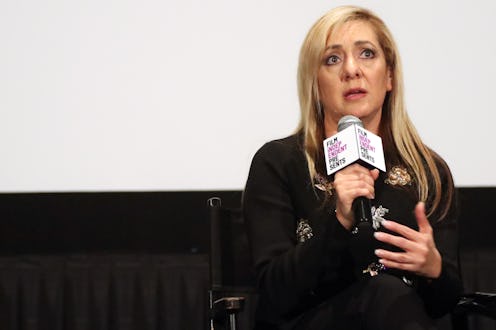Entertainment
The 'Lorena' Documentary Will Make You Rethink Every "Lorena Bobbitt" Joke You Ever Laughed At

When the Lorena and John Wayne Bobbitt case made the news in 1993, everyone seemed to interpret the story of a woman cutting off her husband's penis differently. For some, it was a crass yet hilarious tale of a woman's revenge. For others, it was a horror story about a husband losing his "manhood." Kids on the playground joked about Lorena Bobbitt; mainstream comedians like Robin Williams and David Letterman worked jokes about her into their sets. But what was largely missing from the conversation at the time was a discussion of how this crime could also be seen as a cry for help from a victim living in a world that too often dismisses domestic violence. Finally, Lorena, Amazon's new docuseries premiering Feb. 15, will tackle just that.
Lorena makes the case that the news media helped to misconstrue some of the very serious issues at play for the sake of a penis joke, and questions why exactly people found Lorena Bobbitt's story so amusing. It is, after all, a story about a woman who mutilated her husband, and later alleged that he abused and raped her throughout her marriage.
Still, comedians like David Letterman, Martin Lawrence, Robin Williams, Carlos Mencia, Andrew Dice Clay, and "Weird Al" Yankovic, and many others all had their own takes on the event. Shock jock Howard Stern collaborated with John Wayne Bobbitt multiple times and, as shown in the docuseries, said on his radio show, "I don’t even buy the whole story that he was raping her. She’s not that great looking."
There were eventually three trials in the Bobbitt case, though only two took place in an actual courtroom. Lorena admitted perpetrating violence against her husband, but she also alleged that she had suffered from years of abuse and rape in her marriage, which she testified to during both her and her husband's trial. John Wayne was found not guilty of domestic abuse at his own trial; Lorena was acquitted of mutilation in 1994 and spent time in a psychiatric hospital after her trial.
But Lorena was also tried, in a sense, in the media at the time, and there she was found decidedly guilty as its presented in the documentary, at least. Leading up to and throughout her trial, Lorena was often demonized as a jealous, lying, violent woman. Or, as one headline read, a "hot blooded Latina" who mutilated her husband because he orgasmed first. While there were groups that supported Lorena and attempted to draw attention to her allegations of abuse, they are shown to be in the minority in the documentary.
Lorena acknowledges that the culture is changing now and that people are having conversations about violence against women in a way that was absent from the broader cultural conversation in 1993, and that the nagging human impulse to turn everything into a joke can distract from the conversations that people should be having. While comedy can be an effective tool for calling attention to something, it's just as effective at disregarding legitimate issues that should be addressed.
The same way that jokes rooted in homophobia and transphobia invalidate queer and trans lives, or how blackface does the same for African-Americans, jokes about the Bobbitt case allow everyone to have a laugh at Lorena Bobbitt's expense, essentially turning her into an outlier.
According to the National Coalition Against Domestic Violence, nearly 20 people per minute are physically abused by an intimate partner in the United States. Every joke that claimed Lorena was lying about the spousal abuse she faced, called her "crazy," or made her look ridiculous invalidated the experience of domestic violence survivors.
Stern and other comedians may have been "just cracking jokes," but those jokes prop up a culture that allows women like Lorena to be dismissed and have their pain to be invalidated. Lorena shows America being given an opportunity to have conversations about topics about domestic violence, rape within a marriage, racial stereotypes, and ignoring all of that for the opportunity to crack penis jokes.
Thankfully, Jordan Peele's documentary may be as close as audiences get to a do-over.
If you or someone you know is experiencing domestic abuse, call 911 or the National Domestic Violence Hotline at 1(800) 799-SAFE (7233) or visit thehotline.org.